Related Research Articles

Clive Barker is an English playwright, novelist, film director, and visual artist. Barker came to prominence in the mid-1980s with a series of short stories, the Books of Blood, which established him as a leading horror writer. He has since written many novels and other works, and his fiction has been adapted into films, notably the Hellraiser and Candyman series. He was also the executive producer of the Academy Award winning film Gods and Monsters.
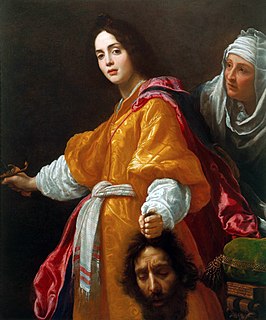
The Book of Judith is a deuterocanonical book, included in the Septuagint and the Catholic and Eastern Orthodox Christian Old Testament of the Bible, but excluded from the Hebrew canon and assigned by Protestants to their apocrypha. It tells of a Jewish widow, Judith, who uses her beauty and charm to destroy an Assyrian general and save Israel from oppression. The surviving Greek manuscripts contain several historical anachronisms, which is why some scholars now consider the book non-historical: a parable, a theological novel, or perhaps the first historical novel.
The Old English poem Judith describes the beheading of Assyrian general Holofernes by Israelite Judith of Bethulia. It is found in the same manuscript as the heroic poem Beowulf, the Nowell Codex, dated ca. 975–1025. The Old English poem is one of many retellings of the Holofernes–Judith tale as it was found in the Book of Judith, still present in the Catholic and Orthodox Christian Bibles. Most notably, Ælfric of Eynsham, late 10th-century Anglo-Saxon abbot and writer, composed a homily of the tale.

Artemisia Lomi or Artemisia Gentileschi was an Italian Baroque painter, now considered one of the most accomplished seventeenth-century artists working in the style of Caravaggio. In an era when women had few opportunities to pursue artistic training or work as professional artists, Artemisia was the first woman to become a member of the Accademia di Arte del Disegno in Florence and had an international clientele.
Howard Barker is a British playwright, screenwriter and writer of radio drama, poet, and essayist writing predominantly on playwriting and the theatre. The author of an extensive body of dramatic works since the 1970s, he is best known for his plays Scenes from an Execution, Victory, The Europeans and The Possibilities, as well as being a founding member, primary playwright and stage designer for British theatre company The Wrestling School.

Harley Granville-Barker was an English actor, director, playwright, manager, critic, and theorist. After early success as an actor in the plays of George Bernard Shaw he increasingly turned to directing and was a major figure in British theatre in the Edwardian and inter-war periods. As a writer his plays, which tackled difficult and controversial subject matter, met with a mixed reception during his lifetime but have continued to receive attention.
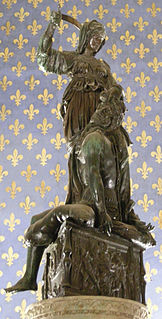
Judith and Holofernes (1457–1464) is a bronze sculpture created by the Italian Renaissance sculptor Donatello at the end of his career. It can be seen in the Hall of Lilies, in the Palazzo Vecchio, Florence, Italy. A copy stands in one of the sculpture's original positions on the Piazza della Signoria, in front of the Palazzo Vecchio.

Judith, is an opera in five acts, composed by Alexander Serov during 1861–1863. Derived from renditions of the story of Judith from the Old Testament Apocrypha, the Russian libretto, though credited to the composer, has a complicated history. The premiere took place in 1863 in Saint Petersburg. This stage debut, supplemented with his next opera Rogneda, made Serov the most important Russian opera composer of the 1860s.
Victoria Wicks is a British actress. She is known for her role as Sally Smedley in Channel 4's award-winning comedy series Drop the Dead Donkey (1990-1998). Her other television roles include Mrs. Gideon in The Mighty Boosh (2004), and the College Director in Skins (2007–08). Her film appearances include The Imitation Game (2014) and High-Rise (2015). She is an Associate of Howard Barker's theatre company, the Wrestling School.
Judith is a homily written by abbot Ælfric of Eynsham around the year 1000. It is extant in two manuscripts, a fairly complete version being found in Corpus Christi College Cambridge MS 303, and fragments in British Library MS Cotton Otho B.x, which came from the Cotton Library.
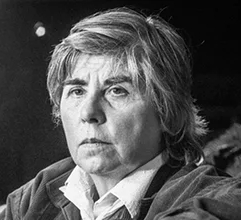
Patricia Ann Jellicoe was a British playwright, theatre director and actress. Although her work covered many areas of theatre and film, she is best known for "pushing the envelope" of the stage play, devising new forms which challenge and delight unconventional audiences. As a result, her dramatic career is, in many ways, unique in the twentieth century.
The Westminster Theatre was a theatre in London, on Palace Street in Westminster.
Brink Productions is an Australian theatre company based in Adelaide, specialising in the ensemble-development of new writing.
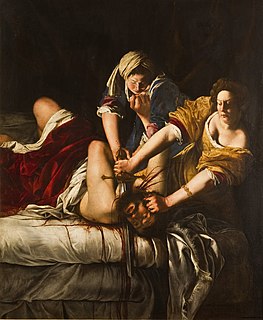
The account of the beheading of Holofernes by Judith is given in the deuterocanonical Book of Judith, and is the subject of many paintings and sculptures from the Renaissance and Baroque periods. In the story, Judith, a beautiful widow, is able to enter the tent of Holofernes because of his desire for her. Holofernes was an Assyrian general who was about to destroy Judith's home, the city of Bethulia. Overcome with drink, he passes out and is decapitated by Judith; his head is taken away in a basket.

Judith Slaying Holofernes is a painting by the Italian early Baroque artist Artemisia Gentileschi, completed in 1612-13 and now at the Museo Capodimonte, Naples, Italy. It is considered one of her iconic works. The canvas shows the scene of Judith beheading Holofernes. Early feminist critics interpreted the painting as a form of visual revenge following Gentileschi's rape by Agostino Tassi in 1611; more recent analysis of the painting has taken a broader view, seeing the painting in the context of Gentileschi's achievement in portraying strong women. The subject takes an episode from the apocryphal Book of Judith in the Old Testament, which recounts the assassination of the Assyrian general Holofernes by the Israelite heroine Judith. The painting shows the moment when Judith, helped by her maidservant Abra, beheads the general after he has fallen asleep drunk.
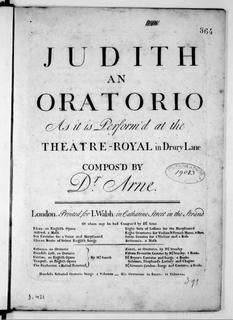
Judith is an oratorio composed by Thomas Arne with words by the librettist, Isaac Bickerstaffe. It was first performed on 27 February 1761 at Drury Lane Theatre. It depicts the story of Judith, taken from the Book of Judith of the Old Testament. It was first published in 1761 and republished with edits in 1764. The piece is divided into three acts, with a total of 28 movements including nine choruses, two duets, an overture, and 16 arias.
Gertrude – The Cry is a play by British playwright Howard Barker. The play had its world premiere in 2002, directed by the author, in the great hall of Elsinore Castle, Denmark as part of the annual international Hamlet Festival. Its original production featured actors Tom Burke, Sean O'Callaghan, Jason Morell, Justin Avoth, Emma Gersch, Jane Bertish and Victoria Wicks.
Scenes from an Execution is a play by the English playwright Howard Barker. The plot revolves around a female artist's struggles against the Venetian city-state in the aftermath of the 16th century Battle of Lepanto. Although the city commissions the painting to celebrate the victory over the Turks, the artist's vision differs dramatically from that of the Doge and the Catholic Church. The play has been described as "Barker's most famous and accessible play".

Head of a Tyrant or Judith and Holofernes is a 1959 Italian-French historical film directed by Fernando Cerchio and starring Massimo Girotti, Isabelle Corey and Renato Baldini.
The Wrestling School is a British theatre company, founded and led by playwright Howard Barker.